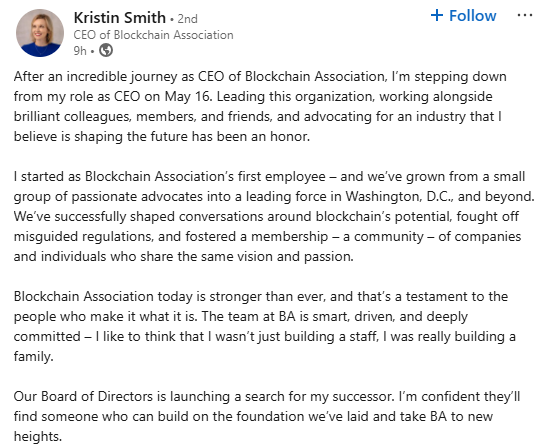Kristin Smith, CEO of the U.S.-based Blockchain Association (BA), will step down from her role in May to join the newly launched Solana Policy Institute, marking a significant shift in leadership within the crypto advocacy space.
In an April 1 announcement, the Blockchain Association said Smith would officially step down on May 16. Just three days later, she will assume the role of president at the Solana Policy Institute, a non-partisan nonprofit aiming to promote crypto education and policy engagement in Washington, D.C.
The association did not immediately disclose who will succeed Smith or elaborate on the reasons for her departure. Cointelegraph reached out for comment but had not received a response at the time of publication.

Smith has led the Blockchain Association since 2018, playing a key role in shaping crypto advocacy in Washington during a period of heightened scrutiny and regulatory uncertainty. She previously served as deputy chief of staff for former Montana Representative Denny Rehberg, bringing experience from both the policy and industry arenas.
Her transition to the Solana Policy Institute comes shortly after Miller Whitehouse-Levine, former DeFi Education Fund CEO, left his post to become the Solana group’s CEO. Whitehouse-Levine has stated that the new institute’s mission is to educate U.S. lawmakers and regulators about Solana’s role in the blockchain ecosystem.
Blockchain Association’s Legal and Regulatory Influence
Under Smith’s leadership, the Blockchain Association became a key voice in the crypto industry’s policy efforts, representing major firms including Coinbase, Ripple Labs, and Chainlink Labs. The group has:
- Filed a lawsuit against the IRS, challenging broker-reporting requirements for crypto transactions
- Criticized the SEC, particularly under former Chair Gary Gensler, for pursuing a “regulation by enforcement” strategy that created legal ambiguity and significant costs for crypto firms
Smith’s departure leaves an open question about the BA’s next phase and how it will continue advocating for industry interests amid evolving federal oversight.
The Solana Policy Institute, officially launched just days ago, has not announced specific legislative or regulatory priorities. The group describes itself as a nonpartisan nonprofit, though its initial hires clearly show that it’s attracting top talent from within the crypto advocacy world.
While the institute’s early focus centers on educating policymakers, it remains to be seen whether it will take a more active role in lobbying or litigation, like the Blockchain Association has under Smith’s guidance.
A Strategic Shift Amid Regulatory Uncertainty
Smith’s move highlights a broader trend: as regulatory frameworks around digital assets continue to evolve, major blockchain ecosystems like Solana are building their own policy infrastructure to ensure their voices are heard in Washington.
With two high-profile hires already in place, the Solana Policy Institute seems poised to play a more prominent role in shaping the conversation around decentralized technologies, scalability, and crypto innovation in the U.S.





